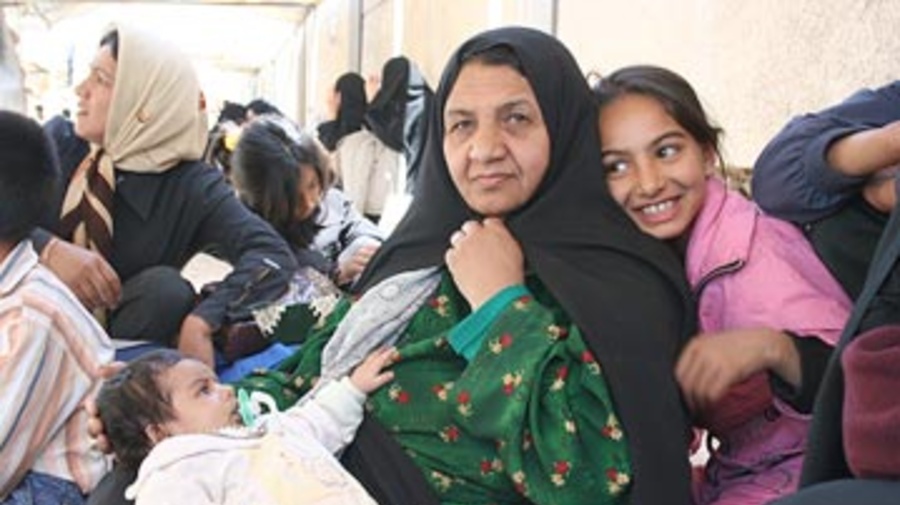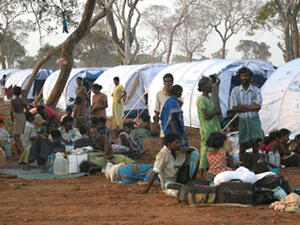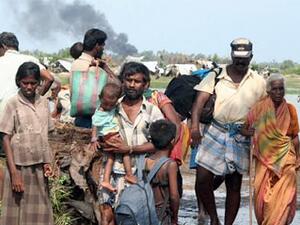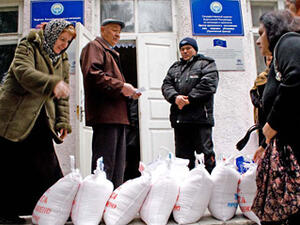The many roads home from Iran to Afghanistan
The many roads home from Iran to Afghanistan

Eight-year-old Massudeh (in pink) knows nothing about Kabul but is eager to return. She waits to leave Iran from Khavaran Departure Centre outside Tehran.
KHAVARAN, Iran, May 30 (UNHCR) - Afghans in Iran have at least three ways of going back home-assisted voluntary repatriation, spontaneous return and deportation. But at Khavaran Departure Centre just outside the Iranian capital, Tehran, the paths sometimes converge.
On one end of the centre, families load their worldly possessions onto a container truck, bidding tearful farewells to friends and relatives. As registered Afghans with Amayesh II cards issued by the government, they are entitled to a repatriation package of travel and reintegration grants of US$100 per person and up to US$500 per family of five or more.
At the other end of the centre, groups of mostly single men lug smaller bags up buses chartered by the government. They lack the proper documents to stay - Amayesh II cards, visas or work permits - and are considered unlawful residents.
These men have chosen a softer alternative to deportation. As "spontaneous" returnees, they approach the authorities to declare their intention to return and are given time to obtain confirmation of their nationality from one of the Afghan consulates in Iran, as well as proper exit permits issued by the Bureau for Aliens and Foreign Immigrant Affairs (BAFIA). From Khavaran, they pay for transport provided by the authorities.
With everyone heading the same way - to the Dogharoun border crossing with western Afghanistan - mixed situations and blurred distinctions between these groups is common.
"We're leaving today because my two sons were deported four months ago and I cannot support the family alone," said Mirajan Abdul, 34, who was returning on a UNHCR convoy with his registered family of eight. He said his sons were not included in the government registration of 2005-2006 as they had temporarily gone back to Kabul for their grandmother's funeral. Earlier this year, they were arrested while working as car washers in Tehran, and deported to Afghanistan.
Mirajan's daughter-in-law Shiba Tajik, 17, was pregnant when her husband was deported and gave birth to a baby girl in his absence. Mirajan himself fell while working on a building site and was hospitalised for three months. "The doctors said I was beyond hope. My family even bought a coffin," he recalled. "But today I'm alive and not buried in this land. So now I'm going home even though I don't know what I'll do in Kabul."
Massudeh, his eight-year-old daughter, added: "I like going to school in Tehran. I have many Iranian friends. I don't know anything about Afghanistan but I am happy to go back."
Nearby, another family fights back tears as their daughter leaves with her husband's family for Kabul. Father Mohammed Gholami, a 52-year-old construction worker, plans to follow soon.
"Our Amayesh II card is registered in Qazvin [west of Tehran], where we lived for 12 years. But there were no jobs so we came to Tehran four years ago. Now we face problems with the disciplinary forces," he said, noting that the card limits movement only to his registered province. "We will go back to Bamiyan in a few months. We have some relatives there but we have no news from them. I'm not sure what I'll do there; I have a small piece of land but not enough for farming."
The Iranian government's current strategy is to encourage registered Afghans to return home voluntarily while cracking down on the undocumented ones. "We're worried about the large number of illegal Afghans who come through organized networks of human traffickers," said BAFIA spokesman Behrouz Permoun. "They usually come for economic reasons and use Iran as a gateway to Europe. But many don't manage to leave our country, they stay and create problems. Others come with a visa and stay on illegally after it expires."
He added that before the latest round of deportation started on April 21, the government had given ample warning to the migrants illegally in Iran as well as the Afghan embassy and consulates. "We gave them a chance to tie up loose ends and get the necessary permits to leave," he said, noting that some 40,000 Afghans had returned spontaneously in recent months. "But many stayed."
According to the Afghan authorities, some 90,000 undocumented Afghans have been deported since April 21. "UNHCR recognizes the Iranian government's right to tackle illegal migration on its soil, but we have strongly appealed to the authorities to do so in a humane manner, treating deportees with dignity and giving them time to pack and make arrangements for their families," said Salvatore Lombardo, UNHCR's representative in Afghanistan.
As for the 915,000 registered Afghans who are still legally living in Iran, the government has started an initiative to regulate their movements and improve the chances of sustainable return. "Considering the economic problems inside Afghanistan, the Iranian government has proposed a programme to encourage families to repatriate by guaranteeing work permits to one or two family members if the whole family returns. Those with work permits can return to Iran to work and support their families in Afghanistan," said Permoun. "We've managed to get 300,000 permits valid for three years. I hope we can implement it soon in coordination with the ministries of labour and foreign affairs."
More than 860,000 Afghans have voluntarily repatriated from Iran since UNHCR started assisting returns in 2002. After the initial euphoria of mass returns in the post-Taliban era, the pace of returns has slowed in recent years - down to 5,000 in 2006 and some 2,000 so far this year.
By Vivian Tan in Khavaran, Iran









